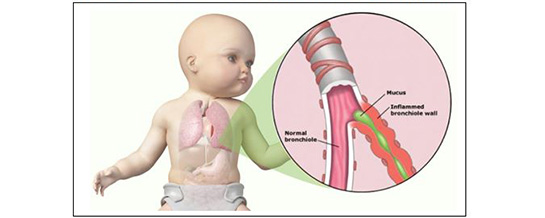How to Care for Your Child with Bronchiolitis

What is Bronchiolitis?
Bronchiolitis is an inflammation of smallest airways and breathing tubes in the lung. When these tubes are affected, they get swollen and full of mucus that make it hard for your child to breath. Bronchiolitis is a common winter illness in infants under 1yr. It is contagious and can transmit from one child to another.
What causes Bronchiolitis?
The most common cause is a virus called Respiratory syncytial virus (RSV) but can also be caused many other viruses
What are the symptoms of Bronchiolitis?
Your child may experience the following symptoms:
- Coughing
- Wheezing
- Breathing difficulties
Fever normally resolve quickly, breathing improve after few days but cough can last for a few weeks up to 6 weeks
How is Bronchiolitis diagnosed?
The doctor will ask few questions about your child’s health and then examine your child.
Blood test and x-rays are not usually necessary.
How is Bronchiolitis treated?
There is no medicine to treat Bronchiolitis. However supportive treatment is useful to manage your child’s condition:
- Give you child paracetamol (any brand) or ibuprofen (any brand) for fever and discomfort
- Avoid aspirin, Aspirin is dangerous and can cause serious complications to children
- For a baby with a stuffy nose, you can help get the mucus out with normal saline (saltwater) drops.
- Make sure your child is drinking adequately and continue regular feeding
- If your child can't drink a lot at once, try small and more frequent feeds.
- Avoid giving cough and cold medicine for children younger than 6 years old, they can cause serious side effects and do little to improve symptoms
Home care advice
- Keep your child home from childcare or nursery until there is no fever or runny nose for at least 24 hours.
- Do not allow anyone to smoke around your child, smoking can make your child cough and wheeze more
How can I prevent Bronchiolitis?
To prevent severe bronchiolitis:
- Make sure your child receives yearly vaccination for influenza viruses for children older than six months.
- If your baby was born early or has a medical condition, ask about the RSV special injection. This injection normally given into the muscle once per month for five months before the RSV season. This medicine doesn't prevent RSV, but it can make bronchiolitis less severe if a baby does get it.
- To help prevent the spread of viruses, all family members should:
- Wash hands properly using soap and water for at least 20 seconds, rinse, and dry thoroughly. This is especially important after coughing or sneezing and before eating or preparing food.
- If soap and water are not available, a hand sanitizer with at least 60% alcohol can be used
- Cough or sneeze into a tissue or into their elbow or upper arm (not their hands).
When should I seek medical advice?
Seek medical advice if:
- Your child continues to have a high temperature more than 3 days
- Your child is breathing faster than usual
- You feel that your child is unwell
- Your child has fewer wet nappies than normal
Go to the Emergency Department or call 999 if your child:
- Stops breathing
- Appears dehydrated with dry and sticky mouth, peeing less, has no tears when crying
- Has difficulty in breathing
- Is too tired to eat or drink
- Is pale and not active
- Has blue lips or fingers
- Looks sicker, less energetic

